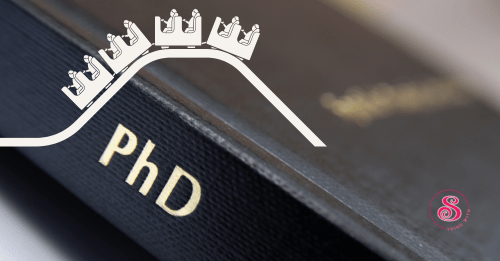Doesn’t it feel nice? The two letters backing your name – Dr. It feels intriguing, right? Pursuing research in the area of your interest, publishing your work, getting the highest academic qualification possible and reaching new heights in your career. This is indeed one side of this coin. But how much are we aware of the other side, the emotional, physical and mental well-being side of academia? Not much I guess.
An Experience of Lifetime
As a fresh doctoral graduate, during my final thesis defence when the examiner panel said that I was being awarded the PhD degree finally, I couldn’t react. I was numb and I didn’t know what to say or do. I was smiling, laughing actually, but I had a lump in my throat. People say before dying life flashes in your eyes. As this journey was coming to an end, my PhD journey was flashing before my eyes, the ride which was not a smooth one, but a roller coaster.
It’s not easy investing 4-5 years of your life to a degree where you have minimal support. Getting a supportive guide is like getting Alladin’s lamp – as rare and perfect as it gets. Some of the most common issues that doctoral students face in general may include, but not limited to:
- Working with someone who doesn’t understand your emotional and personal up-downs
- seeing your peers getting settled in their well-paid jobs and actually enjoying their life ‘after studies’
- getting the same question of “when is your degree getting completed?” at every gathering
- battling procrastination, anxiety, depressive episodes, etc etc.
Is It a Lonely Journey?
It’s not a very pretty picture, is it? But the more people I talk to about this, the more I realise that this is the harsh truth about the PhD. You have to fight alone.
Got really dark really fast no? So what to do to deal with all this? How to maintain our emotional and mental well-being while riding this dark roller coaster of academia? I will share my experience and I hope that can help you even in a very little way, if at all.
What Helped Me?
The thing which I found was really helpful was journaling. Writing down your own thoughts, has a cathartic effect and also its like sorting and arranging your brain cupboard which is overflowing with thoughts and things to do. Secondly, do not forget your own hobbies. Plan your day in such a way that it has at-least 30 mins for your hobbies, passion or anything which soothes your soul. And thirdly, work smart, not hard. There are a lot of software and AI tools which can make your research journey as smoothly as possible. You guys can comment down below and I will do a separate post focussing on these tools.
Takeaway
So, in a nutshell, the journey is a roller coaster. But in the end I just want to say, listen to yourself and your heart. No one will judge if you take 6 years to complete or even leave the degree in between. The most important thing is ‘you’. What do you want to do with your life? If you do complete it, yes, it’s one of the greatest feelings in the world. If not, then its great too. You left something which wasn’t meant for you and that’s a very healthy thing to do. I send my love and hopes to everyone courageous enough to pursue this degree and I hope you conquer all the internal and external demons that will definitely visit you as guests during the journey.

